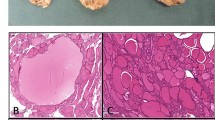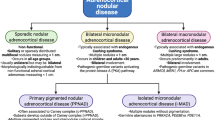Abstract
Medullary thyroid carcinoma (MTC) is a rare neuroendocrine tumor of parafollicular C cells. The majority of MTCs occur sporadically, but about 30% of the cases are associated with multiple endocrine neoplasia type 2 (MEN2) syndrome or familial MTC. Generally, MTCs have no clinical manifestation, but infrequently the patients develop symptoms of hypercortisolism by secreting adrenocorticotropic hormone (ACTH) or corticotropin-releasing hormone (CRH). Although ectopic Cushing syndrome is only found in 0.7% of MTC patients, it can lead to fatal consequences if left untreated. Over 50 cases of MTC-related Cushing syndrome have been reported, and few autopsy cases exist in the literature. In those cases, the tumor cells are positive for calcitonin, but mostly display negative immunostaining for ACTH or CRH. The authors report an autopsy case of a 22-year-old woman who was found dead with no medical history whose cause of death was diabetic ketoacidosis associated with MTC, which showed poor calcitonin stainability.



Similar content being viewed by others
References
Wells SA Jr, Asa SL, Dralle H, Elisei R, Evans DB, Gagel RF, et al. Revised American Thyroid Association guidelines for the management of medullary thyroid carcinoma. Thyroid. 2015;25:567–610.
Hoff AO, Hoff PM. Medullary thyroid carcinoma. Hematol Oncol Clin North Am. 2007;21:475–88.
Barbosa SLS, Rodien P, Leboulleux S, Niccoli-Sire P, Kraimps JL, Caron P, et al. Ectopic adrenocorticotropic hormone-syndrome in medullary carcinoma of the thyroid: a retrospective analysis and review of the literature. Thyroid. 2005;15:618–23.
Valle LA, Kloos RT. The prevalence of occult medullary thyroid carcinoma at autopsy. J Clin Endocrinol Metab. 2011;96:E109–13.
Zhou C, Yool AJ, Nolan J, Byard RW. Armanni-Ebstein lesions: a need for clarification. J Forensic Sci. 2013;58(Suppl 1):S94–8.
Zhou C, Byard RW. Armanni-Ebstein lesions and renal epithelial cell basal subnuclear vacuolations are not the same entity. J Forensic Leg Med. 2013;20:650.
Bondeson L, Ljungberg O. Occult thyroid carcinoma at autopsy in Malmö. Sweden Cancer. 1981;47:319–23.
Komorowski RA, Hanson GA. Occult thyroid pathology in the young adult: an autopsy study of 138 patients without clinical thyroid disease. Hum Pathol. 1988;19:689–96.
Lang W, Borrusch H, Bauer L. Occult carcinomas of the thyroid. Evaluation of 1,020 sequential autopsies. Am J Clin Pathol. 1988;90:72–6.
Thorvaldsson SE, Tulinius H, Björnsson J, Bjarnason O. Latent thyroid carcinoma in Iceland at autopsy. Pathol Res Pract. 1992;188:747–50.
Martinez-Tello FJ, Martinez-Cabruja R, Fernandez-Martin J, Lasso-Oria C, Ballestin-Carcavilla C. Occult carcinoma of the thyroid. A systematic autopsy study from Spain of two series performed with two different methods. Cancer. 1993;71:4022–9.
Furmanchuk AW, Roussak N, Ruchti C. Occult thyroid carcinomas in the region of Minsk, Belarus. An autopsy study of 215 patients. Histopathology. 1993;23:319–25.
Kakudo K, Miyauchi A, Ogihara T, Takai SI, Kitamura H, Kosaki G, et al. Medullary carcinoma of the thyroid. Giant cell type. Arch Pathol Lab Med. 1978;102:445–7.
Talerman A, Lindeman J, Kievit-Tyson PA, Dröge-Droppert C. Demonstration of calcitonin and carcinoembryonic antigen (CEA) in medullary carcinoma of the thyroid (MCT) by immunoperoxidase technique. Histopathology. 1979;3:503–10.
Ruppert JM, Eggleston JC, deBustros A, Baylin SB. Disseminated calcitonin-poor medullary thyroid carcinoma in a patient with calcitonin-rich primary tumor. Am J Surg Pathol. 1986;10:513–8.
Saad MF, Fritsche HA Jr, Samaan NA. Diagnostic and prognostic values of carcinoembryonic antigen in medullary carcinoma of the thyroid. J Clin Endocrinol Metab. 1984;58:889–94.
Bessho T. Immuno-histochemical study of medullary thyroid carcinoma. Nihon Geka Gakkai Zasshi. 1987;88:872–84.
Kristiansen MT, Rasmussen LM, Olsen N, Asa SL, Jørgensen JOL. Ectopic ACTH syndrome: discrepancy between somatostatin receptor status in vivo and ex vivo, and between immunostaining and gene transcription for POMC and CRH. Horm Res. 2002;57:200–4.
Author information
Authors and Affiliations
Corresponding author
Additional information
Publisher's Note
Springer Nature remains neutral with regard to jurisdictional claims in published maps and institutional affiliations.
Rights and permissions
About this article
Cite this article
Cheong, H., Koo, H.L. Medullary thyroid carcinoma with diabetic ketoacidosis: an autopsy case report and literature review. Forensic Sci Med Pathol 17, 711–714 (2021). https://doi.org/10.1007/s12024-021-00407-8
Accepted:
Published:
Issue Date:
DOI: https://doi.org/10.1007/s12024-021-00407-8




